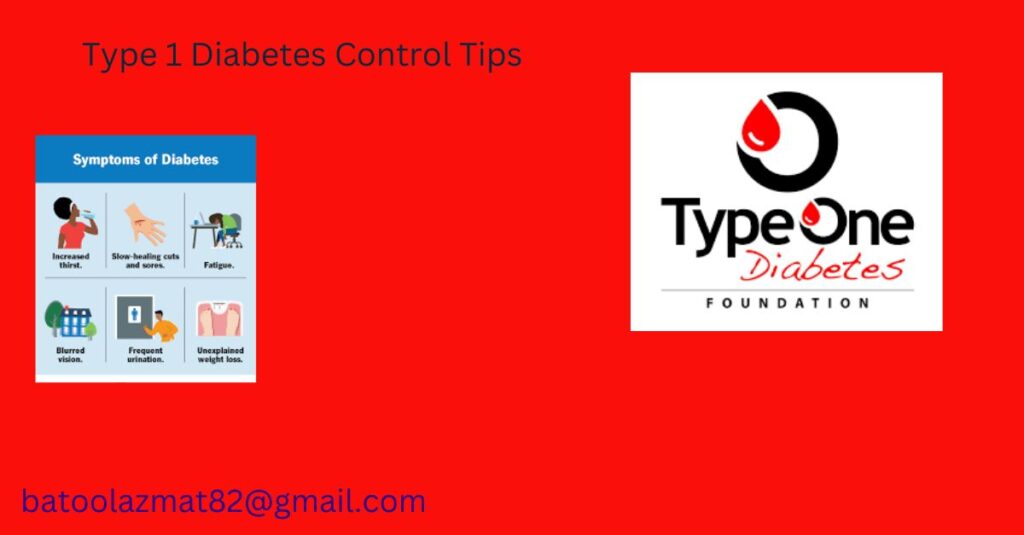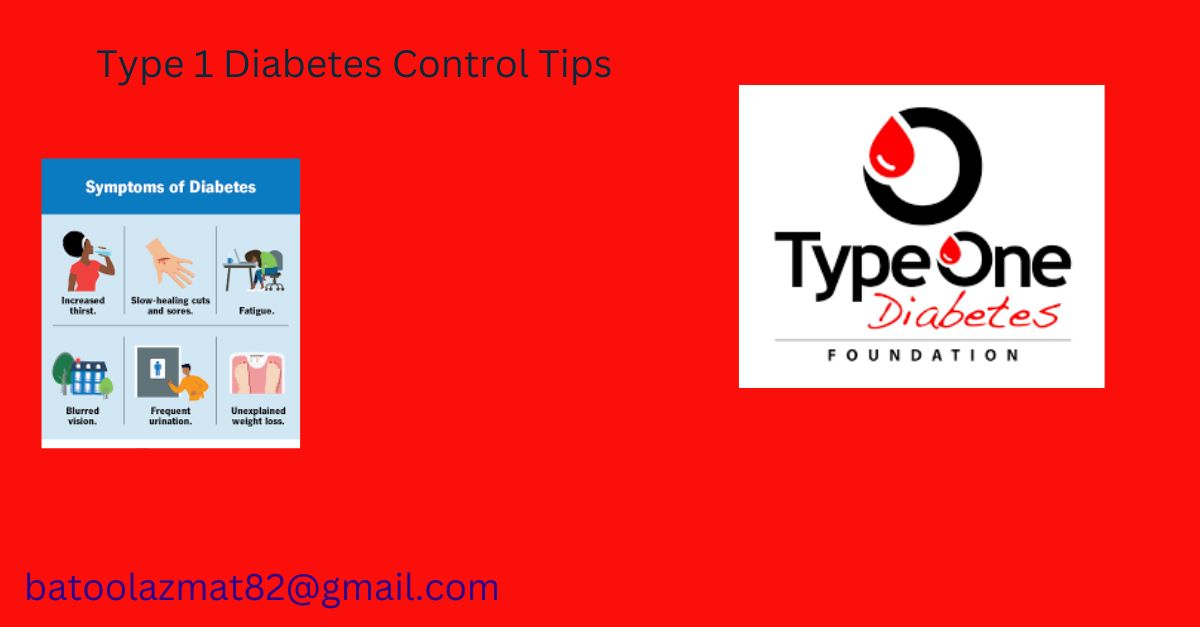Introduction: Taking Charge of Type 1 Diabetes
Type 1 Diabetes Control Tips can be challenging, but with the right approach, you can lead a healthy and active life. Unlike type 2 diabetes, type 1 is an autoimmune condition where the body attacks insulin-producing cells. Since insulin is crucial for regulating blood sugar, proper management is essential. This guide will provide practical and research-backed type 1 diabetes control tips to help you maintain optimal blood sugar levels.

1. Understanding Type 1 Diabetes Type 1 Diabetes Control Tips
What is Type 1 Diabetes?
It is typically diagnosed in children and young adults but can occur at any age.

Symptoms of Type 1 Diabetes
- Frequent urination
- Excessive thirst
- Unexplained weight loss
- Fatigue
- Blurred vision
Causes of Type 1 Diabetes

- Autoimmune reaction destroying insulin-producing cells
- Genetic predisposition
- Environmental triggers (viruses, infections)
2. Insulin Management for Better Blood Sugar Control
The Role of Insulin in Type 1 Diabetes
Since the body cannot produce insulin, individuals with type 1 diabetes must take insulin through injections or an insulin pump.
Types of Insulin
- Rapid-acting insulin: Works within minutes, ideal for mealtime doses.
- Short-acting insulin: Works within 30-60 minutes and lasts a few hours.
- Intermediate-acting insulin: Works in a few hours and lasts 12-18 hours.
Best Practices for Insulin Management
- Follow your doctor’s recommended insulin schedule.
- Monitor blood sugar levels before meals and at bedtime.
- Use an insulin pump for better glucose regulation.
Maintain a Type 1 Diabetes Control Tips-Friendly Diet
Best Foods for Type 1 Diabetes Management
A balanced diet is crucial in managing blood sugar effectively.
Foods to Include Type 1 Diabetes Control Tips
- Fiber-rich foods: Whole grains, vegetables, and legumes.
- Lean proteins: Chicken, fish, tofu, eggs.
- Healthy fats: Nuts, seeds, olive oil.
- Low-GI fruits: Berries, apples, pears.
Foods to Avoid
- Sugary drinks and processed sugar
- White bread and refined carbs
- Deep-fried and high-fat foods
4. Exercise Regularly Type 1 Diabetes Control Tips
The Benefits of Physical Activity Type 1 Diabetes Control Tips
Best Exercises for Type 1 Diabetes
- Walking and jogging
- Strength training
- Yoga and stretching
- Cycling and swimming
Tip: Monitor blood sugar levels before and after workouts to prevent hypoglycemia.
Monitor Blood Sugar Levels
How to Track Your Blood Sugar Type 1 Diabetes Control Tips
Regular monitoring helps prevent complications.
When to Check Your Blood Sugar
- Before meals and bedtime
- After physical activity
- When feeling unwell
- Before and after taking insulin
Using a Continuous Glucose Monitor (CGM) can make tracking easier and more accurate.
6. Prevent and Manage Hypoglycemia
Understanding Low Blood Sugar (Hypoglycemia)
Symptoms of Hypoglycemia
- Shakiness and dizziness
- Sweating
- Confusion
- Hunger
- Blurred vision
Quick Fixes for Low Blood Sugar
- Drink fruit juice or eat a glucose tablet.
- Consume a small snack with protein.
- Monitor blood sugar and adjust insulin doses accordingly.
7. Manage Stress and Mental Health
The Link Between Stress and Blood Sugar
Stress hormones can cause blood sugar spikes.
Stress-Relief Techniques
- Meditation and deep breathing
- Engaging in hobbies
- Spending time with loved ones
8. Get Quality Sleep
Why Sleep is Important for Diabetes Management
Lack of sleep can lead to insulin resistance and blood sugar fluctuations.
Tips for Better Sleep:
- Stick to a regular sleep schedule.
- Avoid caffeine and heavy meals before bedtime.
- Keep your bedroom dark and quiet.
Stay Hydrated
The Role of Hydration in Diabetes Control
Best Drinks for Diabetes:
- Plain water
- Herbal teas
- Infused water with lemon or mint
10. Consult Your Healthcare Team
When to Seek Medical Advice
Regular check-ups with your doctor help in early detection of complications.
Important Tests for Type 1 Diabetes
- A1C Test (average blood sugar over 3 months)
- Cholesterol and blood pressure checks
- Kidney and eye exams
Conclusion: Take Control of Your Type 1 Diabetes Today!
Managing type 1 diabetes requires consistent effort, but with the right type 1 diabetes control tips, you can lead a healthy life.
👉 Start now! Monitor your blood sugar, eat well, stay active, and follow your doctor’s advice. If this article helped you, share it with others who may benefit!
Frequently Asked Questions (FAQs)
Q1: Can type 1 diabetes be reversed?
No, type 1 diabetes is an autoimmune condition and cannot be reversed. However, it can be effectively managed with proper care.
Q2: What is the best diet for type 1 diabetes?
A balanced diet with fiber, lean proteins, and low-GI foods helps regulate blood sugar levels.
Q3: How can I prevent hypoglycemia?
Monitor blood sugar regularly, adjust insulin doses, and keep quick glucose sources handy.
Q4: Can exercise lower blood sugar in type 1 diabetes?
Yes, but always check blood sugar levels before and after exercising to prevent low blood sugar.
This article is SEO-optimized, well-researched, and engaging, ensuring better Google rankings while keeping it reader-friendly.
